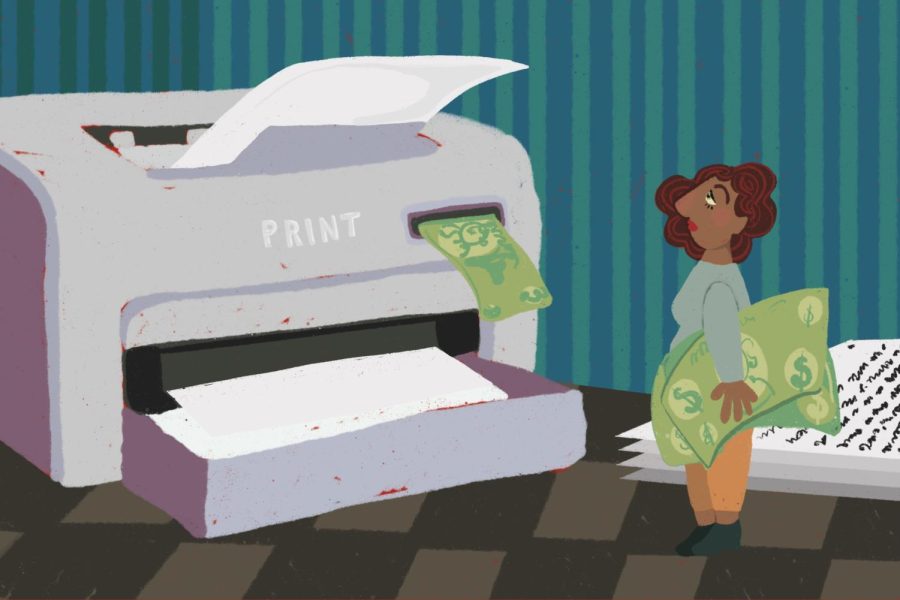Students shouldn’t have to pay to print
April 22, 2022
At this point in the semester, I’ve printed roughly 200 sheets of paper for a class I’m in. After my apartment building’s printer stopped being restocked with paper and I felt guilty asking my peers to spend money to print for me, I purchased my own package of printer paper to use at my apartment, knowing it would be cheaper than printing at one of UT’s libraries.
If that sounds ridiculous, that’s because it is.
UT charges 10 cents to print one-sided black and white pages or 16 cents for double-sided ones. For color ink, it costs 40 cents per side. Students shouldn’t have to pay to print, especially when many classes require assignments to be printed. UT administration should either make printing services free or offer all students semesterly printing credits.
Since 2017, at least three Daily Texan articles specifically called for UT to make printing free or offer printing credits to every student. It’s clear students take issue with spending money to print at a University that is clearly capable of funding printing services.
Not every UT student has the financial means to pay out of their own pockets.
“I’m definitely angry, and I’m (not), you know, picketing, or whatever, but, if there was (a picket line), I’d show up,” said Gabe Schulze, a rhetoric and writing junior.
This current model of paying to print in UT libraries is essentially asking students to spend money to keep up in class, and that’s simply not fair, accessible or equitable.
“I think it’s really stupid that we have to pay for a printing service, because I’m pretty sure other universities, even if they charge for a printing service, they still give each student a certain amount of money that they can use (for printing),” said Sophia Gutierrez, international relations and global studies senior.
UT-San Antonio, the University of Michigan and Texas A&M all offer students printing credits. Texas A&M is the highest-attended university in Texas, with roughly 55,000 undergraduate students enrolled –– that’s about 15,000 more than UT as of 2020.However, they give each student $30 a semester to print.
Civil, architectural and environmental engineering students at UT receive a printing credit of $40 each semester. While this is a great service for these students, other majors, such as design, often require lots of printing, especially in color.
“I feel like that’s just a student service, regardless of your major,” Gutierrez said.
Not only is administration placing an unfair burden on students with a socioeconomic roadblock to success, but they’ve also caused library faculty to come up with solutions for a problem they didn’t cause. This shouldn’t be the case.
UT libraries are trying to help by offering free scanning services. Unfortunately, they are unable to make printing free or offer a credit –– only administration is able to do that.
When I asked the UT Budget Office for an interview, they said they do not control printing prices and connected me with Travis Willmann, the communications officer for UT Libraries, who has been interviewed regarding this issue twice since 2018.
“While the fees for printing remain in place to recover costs for the service, the Libraries have invested in book scanners that can be used free of charge,” Willmann said in an email. “It’s another facet of the transition from analog to digital media, and a way to provide a cost-free option where other fees may create a barrier to access.”
UT Libraries do not make a profit from printing, and offer free scanning services to help alleviate the financial barriers that printing can and does cause. While this is very generous, the UT Libraries should not have to take it upon themselves to help. Rather, UT Administration should pay attention to its students’ needs and either make printing free or provide a semesterly printing credit.
Willmann also said that other universities’ printing credits are most likely enacted by their respective administrations, not the library systems.
“Some people don’t have $20 just to put into their account (for printing),” Gutierrez said. “Some people need every penny because, you know, just to buy groceries, and instead they have to spend it on homework.”
Kunzi is a rhetoric and writing junior from Las Vegas, Nevada.












